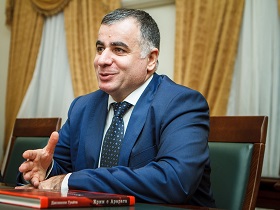Strategic relations between Russia and Armenia have been progressing along all tracks, within both bilateral and international organization frameworks, with considerably more attention being given to dialogue in the context of Eurasian integration. We met with President of the Russian-Armenian Commonwealth Yuri Navoyan to discuss the key areas of cooperation between the two historic partners, as well as existing and potential hurdles to progress in this area.
Strategic relations between Russia and Armenia have been progressing along all tracks, within both bilateral and international organization frameworks, with considerably more attention being given to dialogue in the context of Eurasian integration. We met with President of the Russian-Armenian Commonwealth Yuri Navoyan to discuss the key areas of cooperation between the two historic partners, as well as existing and potential hurdles to progress in this area.
Armenia is the only South Caucasian country participating in the Collective Security Treaty Organization (CSTO), although truly close engagement seems to exist only with Russia. Hence, two questions. First, how effective is Armenian membership in the CSTO, and second, what are the prospects for Russia-Armenia bilateral cooperation?
As a most responsible CSTO member, Armenia is very particular about honoring its commitments and is active in setting the organization’s agenda. The focus has been on military-political and military-technical cooperation, primarily with Russia. On the one hand, this is reasonable because Russia is the CSTO’s central country. In fact, the CSTO could be divided into three zones, i.e. Russia and the Armenia-based south, Russia plus Belarus in the west, and Central Asia.
The CSTO is critically important in view of political containment, as it has become a capable actor in the construction of the entire regional security environment. Moreover, before the Eurasian Economic Union (EEU) emerged, the CSTO had actually been the most efficient structure in the Commonwealth of Independent States. Quite naturally, it works as a balancer and instrument of restraint, especially in the geopolitically complicated South Caucasus.
On the other hand, the CSTO is developing quickly and is far from a decorative organization. All decisions made by the heads of states are fulfilled to the letter and large-scale exercises are regularly held, many of them in Armenia, to improve the readiness of all member forces as well as the Armenian army.
Armenia’s accession to the EEU is definitely a momentous step for the country, which is now seeing impressive opportunities. However, problems are emerging related to the convergence of customs regimes, for example with higher import tariffs. To this end, how would you assess the impact of Armenia’s membership in the group?
Armenia was entering the EEU amidst negotiations over an association agreement with the European Union. And Yerevan appears to have made a rational political decision. Why rational? First of all, remember the nature of Russian-Armenian relations, not only military-political ones but also economic ties pointing to the fact that Armenia cannot step aside if its main strategic partner launches sub-regional or economic projects. The question at hand concerns about the degree and conditions for Armenia to participate in the EEU. Initially, the absence of a common Russia-Armenia border was seen as a formidable hurdle to Yerevan’s full-fledged membership, but a joint intergovernmental panel of experts found it of minor significance. As a result, the EU association process was suspended, and now Armenia enjoys full EEU membership. As a WTO member, Armenia liberalized its trade back in early 1990s and now boasts very low tariffs. There are some other EEU-related problems that need to be reduced to a common denominator; therefore, Armenia’s EEU agreement provides for different transitional periods for certain goods and the adjustment of customs dues by 2022.
The ties between Armenia and Russia are extremely close, as over two million Armenians reside in Russia and the bilateral relationship has an impact on virtually every Armenian family. But in its new role, Yerevan must upgrade its agenda vis-à-vis Russia both within the bilateral and the EEU frameworks.
On the other hand, I agree with some Russian experts who qualify Armenia as an underestimated partner for Russia in the South Caucasus. Armenia is critically important for Russia, which makes the alliance with Yerevan even more geopolitically attractive within the EEU. Quite literally, it was solely because of Armenia that Russia remained in the South Caucasus in early 1990s and continues to play a role there.
Could Armenia move ahead with its EEU integration, for example, through the creation of a currency union? What is Yerevan's approach to building a free trade area between the EU and EEU?
In the near future, the currency union is hardly feasible. But if the issue arises, Armenia would proceeds according to its national interests suggesting issues for discussion. An FTA debate would add a positive dynamic to relations between the sub-regional unions. Moreover, Armenia is not going to shut out Europe and other countries. On the contrary, its experience may be of interest for Russia, Kazakhstan and Belarus.
In addition, Armenia may offer an additional platform for dialogue between the EEU and the rest of the world. The huge Armenian diaspora would not allow its government to sink into isolation within a certain bloc. In reality, influence from the diaspora has become absolutely vital for economic development after Armenia became independent. A genuinely rational policy invariably would require taking into account Armenia’s integration with the rest of the world.
What is your vision for relations between Armenia as an EEU member and Iran, which offers some of the most promising opportunities today?
The Armenian-Iranian dialogue is very healthy both politically and economically. And the emerging rapprochement between Iran and the West, on the one hand, and the creation of the Eurasian Economic Union, on the other, makes the drive towards Tehran even more rewarding. As for future transportation and communication projects within the EEU, through the unblocking of the Abkhazian railway and the construction of a railway extension from Armenia to Iran, Armenia can offer a North-South transportation corridor through to the Persian Gulf across Iran. Iran is also interested in engagement with the EEU via Armenia. And remember that contrary to Turkey, another regional actor, Tehran is quite level-headed on the issue of Nagorny Karabakh, which is positive for Yerevan.
The Ukraine crisis has reenergized self-determination and territorial integrity issues. How could the current political processes there affect the Nagorny Karabakh settlement? Is there a chance for the resumption of fighting? How would you assess the role of the OSCE Minsk Group?
The events in Crimea and Ukraine have once again proven the significance of the peoples’ right for self-determination. To this end, Karabakh offers an affirmative example, since back in the late 1980s when the USSR still existed, its Armenian population used its constitutional right to peacefully and constructively separate from Azerbaijan and become a part of Armenia. When the USSR fell apart in 1991, they held a referendum and established the Nagorny Karabakh Republic. However, Azerbaijan responded with a major military campaign and actually lost the war, after which in 1994, a truce was signed with the help of Russian mediation. The armistice is still in effect, to a great extent because of the Karabakh self-defense force. This is the only modern conflict which is being contained in the absence of peacekeepers. The Karabakh self-defense units do a lot to maintain regional stability, but the threat of war nevertheless exists.
A Karabakh settlement appears practical in the realm of international law, which gives peoples the right to freedom, self-determination and a modern state. In contrast to their neighbors, Karabakh Armenians are building a very efficient state. Watching the electoral process in Nagorny Karabakh, one clearly sees that the republic is unquestionably successful, that it must be recognized as an entity for establishing economic, humanitarian and political ties on a bilateral diplomatic basis.
The Minsk Group presents the main format for negotiations that must be preserved because the OSCE provides the parties with a platform for talks, while the co-chairmen pose as guarantors in the Armenian-Azeri dialogue. However, there is one drawback as the Republic of Nagorny Karabakh has been excluded the talks, although initially their participation was allowed. No final solution is possible until Karabakh’s full participation is restored, because neither party will be able to force an artificial decision on the Karabakh Armenians, who must find a consensus with Baku on the basis of mutually reasonable compromises and concessions. In this case, other countries including the co-chairing states can act as true guarantors, whereas the imposition of bogus models against Karabakh will result in renewed escalation.
What could you say about the Russia-Armenia relationship? What can the Russian-Armenian Commonwealth do to strengthen ties? I have heard that young Armenians in Russia are excited about a future Armenian center in Moscow that could enhance bilateral cultural ties.
The Russian-Armenian relationship is advancing smoothly, in a truly strategic manner, implementing all main activities in the military-political, economic and humanitarian areas. These cooperation programs are long-term, which makes the ties very special. And we have such a powerful catalyst in the diaspora which I regard as an important living glue between the two countries. At the same time, government agencies on both sides sometimes fail to make proper decisions and construct meaningful agendas, thereby suggesting that there is always room for improvement.
The cultural center is a very good opportunity, because the Russian-Armenian Commonwealth has been promoting its creation at numerous forums. The center long ago emerged as a promising solution to resolve problems through intergovernmental agreements. In addition, the Moscow center could work as an additional link to implement all relevant accords. The two countries have established a solid legal basis that also covers humanitarian cooperation and the creation of cultural and information centers on a mutual and equal basis. Russia has been successful at this, among other things by constructing and commissioning the Moscow House, the Rossotrudnichestvo mission and the Russian Center of Culture and Science, which enhance the implementation of Russian federal humanitarian projects and help Armenian society grow closer to Russia. So, Armenia must also realize the right of its citizens and compatriots to preserve their culture and develop more informational and educational resources. These efforts should become a permanent tool to generate new ideas and projects in interstate relations beyond the boundaries of the diaspora.
Compiled by RIAC intern Lousine Mnatsakanyan, RIAC Manager Alexander Eliseev and Website editor Maria Gurova





